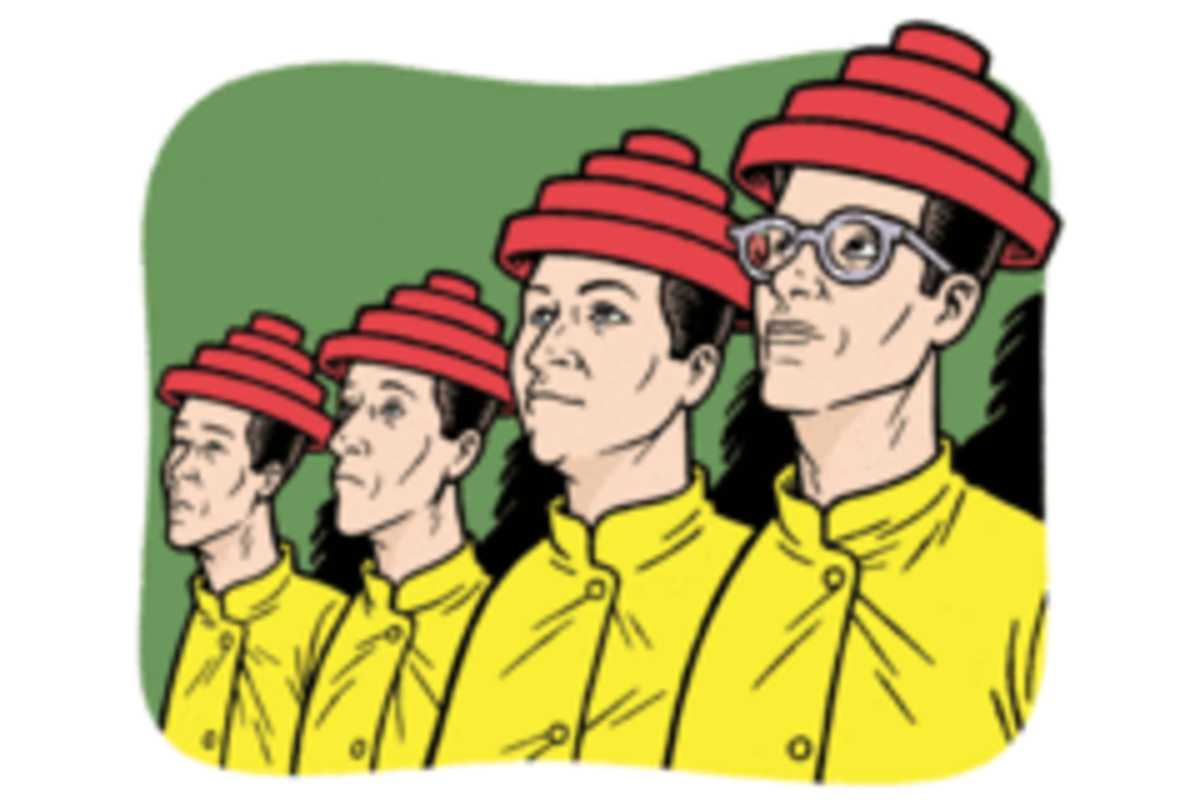Hippie radical activists posing as a
pop band in 1977 they somehow got caught up in the punk wars. They
combined situationism with anti consumer tirades whilst signed to a
major label, they wore plant pots on their heads and wore overalls and
were loved by punks, they were hippie radicals who were closer to an
American version of Crass- art radicals with a serious agenda hidden by a
dark sense of humour and an angular bizarre sense of song
writing.
Few music journeys can have been as odd as this one.
Formed in 1973 and appearing in the middle of the punk rock maelstrom as perhaps the last of David Bowie’s legendary tip offs, Devo were the hippest and weirdest band imaginable- a band that seemed to be operating on the frontline of pop, making a discordant, surreal avant pop noise that was both intriguing and fascinating.
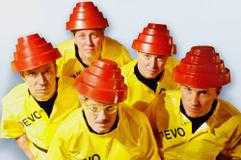 A
couple of years later they were having worldwide hits like it ‘Whip It’
and their subversive message was getting lost in the new video age. They
dressed in weird plastic outfits and sang jerky songs that hinted at
alienation and something far deeper. No-one ever understood who the hell
they were and what they were up to but you could tell it was something a
bit deeper than wacky plastic hats and songs about
potatoes.
A
couple of years later they were having worldwide hits like it ‘Whip It’
and their subversive message was getting lost in the new video age. They
dressed in weird plastic outfits and sang jerky songs that hinted at
alienation and something far deeper. No-one ever understood who the hell
they were and what they were up to but you could tell it was something a
bit deeper than wacky plastic hats and songs about
potatoes.
Thirty years later a reformed Devo are readying a new album and founder member Jerry Casale explains the band’s background and roots which give the whole freaky Devo experience far more context. Far more than a quirky pop experience Devo were counter culture visionaries whose roots lie deep in the late sixties radical struggle.
 ‘I was there at the Kent State
shooting on May 4, 1970 when the national guardsmen killed four students
and wounded nine others at an anti war demo. That day completely
changed me. I was no more Mr. Nice Guy peace and love hippie. I watched
what happened that day and brute power won out and no one was ever held
accountable. The lies by those who control and write history started
immediately. They had townspeople convinced in newspapers that students
had shot guardsmen. Vigilantes were out trying to kill students that
night because of that. Nothing could have been further from the truth.
It was ridiculous and none of that happened. That was the tip of the
coming iceberg. Look at what Bush just got away with for eight years, he
chinned up the whole reason to start bombing Iraq. It was evil and
outrageous and lies and they got away with it.’
‘I was there at the Kent State
shooting on May 4, 1970 when the national guardsmen killed four students
and wounded nine others at an anti war demo. That day completely
changed me. I was no more Mr. Nice Guy peace and love hippie. I watched
what happened that day and brute power won out and no one was ever held
accountable. The lies by those who control and write history started
immediately. They had townspeople convinced in newspapers that students
had shot guardsmen. Vigilantes were out trying to kill students that
night because of that. Nothing could have been further from the truth.
It was ridiculous and none of that happened. That was the tip of the
coming iceberg. Look at what Bush just got away with for eight years, he
chinned up the whole reason to start bombing Iraq. It was evil and
outrageous and lies and they got away with it.’
The Kent State shooting had left its mark and fuelled Casale’s art.
‘Post Kent State I wanted to retaliate and do something. One choice was to have gone militant and joined the Weather Underground people and that would have been ended up in jail and death. I knew them and they were scary, crazy people and I didn’t see it winning out in the end. I didn’t want to go down that road so I took the creative approach, I started working on my art projects which were polarizing and creative and eventually that became Devo.’
 Pop culture
was also very affected by Kent State. Neil Young’s classic ‘Ohio’ summed
up a lot feelings at the time. What did a veteran of the actual event
feel about that song?
Pop culture
was also very affected by Kent State. Neil Young’s classic ‘Ohio’ summed
up a lot feelings at the time. What did a veteran of the actual event
feel about that song?
‘That was ballsy of him to do that but he nailed it. It felt like an out and out civil war. It never felt like the hippies were taking over. It felt like the Karl Rove types were taking over. The counter culture message lost out to these right wing drones like Ann Coulter, Dick Cheney, Fox news types. Counter culture may still exist in the same way that birds are descended from dinosaurs. Harmless and small! I think overall society is going more and more towards this creepy corporate feudal state.’
Busying himself initially in art projects Casale was looking for provocation.
‘It was like performance art. It didn’t have a word or label for it then. It was very confrontational, at first music was just part of it. But when I hooked up with the Mothersbaugh brothers some of those ideas carried on into the early Devo. The initial reaction was quite extreme- people were threatening us, throwing beer bottles at us, grabbing the mic and telling us to fuck off home! Club owners paid us to quit which was nice! The hostile confrontation resolved our confidence because we thought the more we piss people off the more right we are! It proved it was right thing to do!’
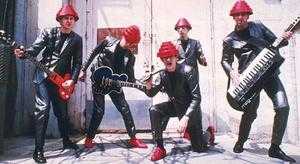 Devo’s mix of aggrieved
counter culture politics, extreme performance art and pop nous was a
weird combination but would quickly make sense in their bizarre
commentary on pop and mainstream culture.
Devo’s mix of aggrieved
counter culture politics, extreme performance art and pop nous was a
weird combination but would quickly make sense in their bizarre
commentary on pop and mainstream culture.
‘The concept came from a lot of collaboration. I was more the theory man and Mark came up with practical ways to sell it to them (laughs). He is a great, great performer. At that time you hadn’t seen anybody doing anything like that. He was like an American Johnny Rotten but in his own way.’
Devo were making a name for themselves on the underground. Their conceptual dressing up, thought provoking left field theories provided by Jerry and the oddly catchy quirky, tough, post punk pop written by Jerry And Mark were ironically starting to attract the attention of the mainstream. Their timing was impeccable. The times were a changing. Punk rock had seen a shift in what people expected from bands.
‘We didn’t know about the Sex Pistols when we started, we only heard about them when they were fully formed and beat us to the punch. We thought wow! they are great and we really liked them when we heard them and the same with the Clash who were my heroes.’
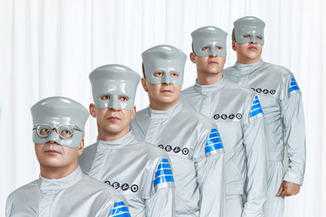 If anything Devo are further proof
that the clichéd old maxim, ‘never trust a hippie’, holds very little
water. The conservative forces have been very good at turning the hippie
stereotype into a character like Neil from the Young Ones- a dumb, dozy
fool. But the hippie hardcore were smart, resourceful and energetic
revolutionary characters. Most of their ideas have been watered down
into the mainstream apart from the best ones which are still too
dangerous in this corporate age. The ideas they were dealing with
though, flavoured so much of pop culture for decades after- Devo being
one example of the way the energy was used in thought provoking and
powerful ways.
If anything Devo are further proof
that the clichéd old maxim, ‘never trust a hippie’, holds very little
water. The conservative forces have been very good at turning the hippie
stereotype into a character like Neil from the Young Ones- a dumb, dozy
fool. But the hippie hardcore were smart, resourceful and energetic
revolutionary characters. Most of their ideas have been watered down
into the mainstream apart from the best ones which are still too
dangerous in this corporate age. The ideas they were dealing with
though, flavoured so much of pop culture for decades after- Devo being
one example of the way the energy was used in thought provoking and
powerful ways.
‘Devo are not anti-intellectual like punk was. We were not nihilistic. We were more like dada than anarchy. We were making fun of the root of the problem, which was the human condition itself. I don’t care if you think you’re a Marxist or a proto fascist you can both be ridiculous. There are a million ways to be wrong and deluded or to start off with an ideal and have it turned inside out. It’s the difference between the communist manifesto and the politburo in the days of soviet union- I don’t think that’s what they had in mind when they came up with the original idea. The rap was great but the reality stunk.’
To make these points Devo played with images and concepts like Devolution and the potato theory.
‘We saw the potato as a kind of metaphor for the common man. That’s how we saw ourselves. You’re not born with the silver spoon in your mouth and leading man looks. You’re there with the general population- we were all potatoes – good spuds and bad spuds! There’s a lot of humour in our work and that’s the difference between us and British punk.
 Devolution to
us was what we saw going on around us which was not progress. Things
were not getting better, man was not getting smarter but rather quite
the opposite- things seemed to be falling apart. On the level of social
government infrastructure things that you took for granted at one time
were crumbling- like the sense of community and the centralisation of
power and the takeover of corporations. There was less and less freedom
and more slogans. More people thinking like little bees in a hive. We
didn’t see any of it being positive. It was more like marching
backwards full speed ahead!’
Devolution to
us was what we saw going on around us which was not progress. Things
were not getting better, man was not getting smarter but rather quite
the opposite- things seemed to be falling apart. On the level of social
government infrastructure things that you took for granted at one time
were crumbling- like the sense of community and the centralisation of
power and the takeover of corporations. There was less and less freedom
and more slogans. More people thinking like little bees in a hive. We
didn’t see any of it being positive. It was more like marching
backwards full speed ahead!’
And it’s these eternal themes that Devo are exploring on their new album- their first new work for decades.
‘You cant help it. I can’t start thinking differently than what I ever have so I guess a lot of subject matter and lyrics still go back over same territory hopefully not in stale way where people think, "oh that’s exactly what they did before!" (laughs). The album has been a long time coming. It’s been twenty years since we put out a record. Devo was in a historical lock box. Apart from doing film and commercial work nobody was interested in collaborating on new music. Around the end of 2007 the idea began to gain momentum and becoming involved with Warners put another layer of corporate involvement and spin on it so the roll out was on their timeline.’
Since the last album Devo have been existing in a very comfortable vacuum. Typical of the counter culture smarts they found comfortable niches in popular entertainment with Jerry making mainstream pop videos.
 ‘It was definitely better than working in a
bank. I realise it wasn’t primary creativity. It was basically
professional problem solving! I had a talent for directing videos and
people paid me to do it. It was a great job and led to making
commercials where people would pay me even more. I was part of the
corporate world and it wasn’t lost on me. Ultimately that’s what
happens- the bartender gets drunk!’
‘It was definitely better than working in a
bank. I realise it wasn’t primary creativity. It was basically
professional problem solving! I had a talent for directing videos and
people paid me to do it. It was a great job and led to making
commercials where people would pay me even more. I was part of the
corporate world and it wasn’t lost on me. Ultimately that’s what
happens- the bartender gets drunk!’
Dealing with the corporate monster has flavoured the new Devo album. Instead of hiding their dealing, Devo have not only embraced but dived in headfirst whilst parodying it on the new album, which takes the fierce marketing of the modern age and turns it on its head.
‘The new album is Devo trying to actually interface with the way things are done today in business. In the past we were just like an alien spaceship that came down and dropped our little thing and then took off. In the old days we didn’t really play ball. We didn’t care what anybody would say. So this time we tried to do the thing that no-one would do which was actually co-operate working with Warners and their marketing budget and then giving it to an ad agency and doing song studies and focus groups soliciting opinions about outfits and all this stuff and actually then listening to the result. The package that comes out as 12 songs on itunes has been determined by people voting in focus groups- the 12 songs that got the most votes are what you will hear in the order of votes (laughs). We used all these ways that corporate structures conduct the business of art.’
 Gerry sees this shift as inevitable in the
modern pop scene.
Gerry sees this shift as inevitable in the
modern pop scene.
‘In a world that doesn’t want to pay for music but has a glut of music how do you know if a band has put out music if it is not marketed and why do you care about the music anyway? No one else does! The music has become the loss leader for branded content. In that kind of world Devo has plusses and minuses. We are too old, yeah! but the plus side is that we are old and everyone knows Devo and thinks they know what that means so we have a shot because the brand means something and we can go out and play concerts and sell merchandise and we can make a livelihood that a lot of new bands can’t do. They don’t make money off their music- so that’s the concept -Devo playing ball with the corporation!’
Common sense or pastiche- you can never tell with Devo.
‘Yeah well we are Devo and we are not going to play it straight’ laughs Casales.
In many ways Devo are a running commentary on the ridiculousness of pop. There first breakthrough was their 1979 vicious re-working of the Rolling Stones ‘Satisfaction’ where they tore the song apart and reconstructed it as a quirky, spasmodic robotic jerk off. Hilariously they had to go and play it to Mick Jagger to get his permission to release the song.
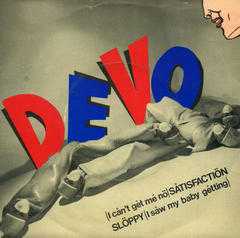 ‘Back when we did that the scene
was far different people took artists rights far more seriously. It
wasn’t a world of samples and mash ups. What we did with that song was
considered parody by the copyright law because we had changed the music
and some of the lyrics and therefore it wasn’t a, quote, reverential
cover and we had to go and see Mick Jagger in New York and play the
track to him. We were in their manager….. Peter Rudge’s office and he
had this three piece, pin stripe suit and shirt with pastel cuffs and
paisley tie on- completely like out of a movie. Jagger walked
in and sat down and listened to the song and about one minute into it
stood up and started dancing around the fireplace saying ‘I like it I
liiike it ‘ (does the accent)…Mark and I were thinking, ‘great he really
likes it!’ and we felt proud and stoked and flew back to California and
told our manager that Mick Jagger liked it and he said, ‘of course he
did because I told Peter Rudge that to make sure Jagger says he likes it
because you guys are going to make him a loads of publishing
money!’
‘Back when we did that the scene
was far different people took artists rights far more seriously. It
wasn’t a world of samples and mash ups. What we did with that song was
considered parody by the copyright law because we had changed the music
and some of the lyrics and therefore it wasn’t a, quote, reverential
cover and we had to go and see Mick Jagger in New York and play the
track to him. We were in their manager….. Peter Rudge’s office and he
had this three piece, pin stripe suit and shirt with pastel cuffs and
paisley tie on- completely like out of a movie. Jagger walked
in and sat down and listened to the song and about one minute into it
stood up and started dancing around the fireplace saying ‘I like it I
liiike it ‘ (does the accent)…Mark and I were thinking, ‘great he really
likes it!’ and we felt proud and stoked and flew back to California and
told our manager that Mick Jagger liked it and he said, ‘of course he
did because I told Peter Rudge that to make sure Jagger says he likes it
because you guys are going to make him a loads of publishing
money!’
Meeting Jagger is another goofy story of Devo’s adventures in music. The eternal counter culture misfits have both been very successful and parodied the endless bread and circus of pop culture. Not that Gerry sees it that way.
‘We are not shocking at all. We are the house band on the Titanic playing until we all go down together.’
Few music journeys can have been as odd as this one.
Formed in 1973 and appearing in the middle of the punk rock maelstrom as perhaps the last of David Bowie’s legendary tip offs, Devo were the hippest and weirdest band imaginable- a band that seemed to be operating on the frontline of pop, making a discordant, surreal avant pop noise that was both intriguing and fascinating.
 A
couple of years later they were having worldwide hits like it ‘Whip It’
and their subversive message was getting lost in the new video age. They
dressed in weird plastic outfits and sang jerky songs that hinted at
alienation and something far deeper. No-one ever understood who the hell
they were and what they were up to but you could tell it was something a
bit deeper than wacky plastic hats and songs about
potatoes.
A
couple of years later they were having worldwide hits like it ‘Whip It’
and their subversive message was getting lost in the new video age. They
dressed in weird plastic outfits and sang jerky songs that hinted at
alienation and something far deeper. No-one ever understood who the hell
they were and what they were up to but you could tell it was something a
bit deeper than wacky plastic hats and songs about
potatoes.Thirty years later a reformed Devo are readying a new album and founder member Jerry Casale explains the band’s background and roots which give the whole freaky Devo experience far more context. Far more than a quirky pop experience Devo were counter culture visionaries whose roots lie deep in the late sixties radical struggle.
 ‘I was there at the Kent State
shooting on May 4, 1970 when the national guardsmen killed four students
and wounded nine others at an anti war demo. That day completely
changed me. I was no more Mr. Nice Guy peace and love hippie. I watched
what happened that day and brute power won out and no one was ever held
accountable. The lies by those who control and write history started
immediately. They had townspeople convinced in newspapers that students
had shot guardsmen. Vigilantes were out trying to kill students that
night because of that. Nothing could have been further from the truth.
It was ridiculous and none of that happened. That was the tip of the
coming iceberg. Look at what Bush just got away with for eight years, he
chinned up the whole reason to start bombing Iraq. It was evil and
outrageous and lies and they got away with it.’
‘I was there at the Kent State
shooting on May 4, 1970 when the national guardsmen killed four students
and wounded nine others at an anti war demo. That day completely
changed me. I was no more Mr. Nice Guy peace and love hippie. I watched
what happened that day and brute power won out and no one was ever held
accountable. The lies by those who control and write history started
immediately. They had townspeople convinced in newspapers that students
had shot guardsmen. Vigilantes were out trying to kill students that
night because of that. Nothing could have been further from the truth.
It was ridiculous and none of that happened. That was the tip of the
coming iceberg. Look at what Bush just got away with for eight years, he
chinned up the whole reason to start bombing Iraq. It was evil and
outrageous and lies and they got away with it.’The Kent State shooting had left its mark and fuelled Casale’s art.
‘Post Kent State I wanted to retaliate and do something. One choice was to have gone militant and joined the Weather Underground people and that would have been ended up in jail and death. I knew them and they were scary, crazy people and I didn’t see it winning out in the end. I didn’t want to go down that road so I took the creative approach, I started working on my art projects which were polarizing and creative and eventually that became Devo.’
 Pop culture
was also very affected by Kent State. Neil Young’s classic ‘Ohio’ summed
up a lot feelings at the time. What did a veteran of the actual event
feel about that song?
Pop culture
was also very affected by Kent State. Neil Young’s classic ‘Ohio’ summed
up a lot feelings at the time. What did a veteran of the actual event
feel about that song?‘That was ballsy of him to do that but he nailed it. It felt like an out and out civil war. It never felt like the hippies were taking over. It felt like the Karl Rove types were taking over. The counter culture message lost out to these right wing drones like Ann Coulter, Dick Cheney, Fox news types. Counter culture may still exist in the same way that birds are descended from dinosaurs. Harmless and small! I think overall society is going more and more towards this creepy corporate feudal state.’
Busying himself initially in art projects Casale was looking for provocation.
‘It was like performance art. It didn’t have a word or label for it then. It was very confrontational, at first music was just part of it. But when I hooked up with the Mothersbaugh brothers some of those ideas carried on into the early Devo. The initial reaction was quite extreme- people were threatening us, throwing beer bottles at us, grabbing the mic and telling us to fuck off home! Club owners paid us to quit which was nice! The hostile confrontation resolved our confidence because we thought the more we piss people off the more right we are! It proved it was right thing to do!’
 Devo’s mix of aggrieved
counter culture politics, extreme performance art and pop nous was a
weird combination but would quickly make sense in their bizarre
commentary on pop and mainstream culture.
Devo’s mix of aggrieved
counter culture politics, extreme performance art and pop nous was a
weird combination but would quickly make sense in their bizarre
commentary on pop and mainstream culture.‘The concept came from a lot of collaboration. I was more the theory man and Mark came up with practical ways to sell it to them (laughs). He is a great, great performer. At that time you hadn’t seen anybody doing anything like that. He was like an American Johnny Rotten but in his own way.’
Devo were making a name for themselves on the underground. Their conceptual dressing up, thought provoking left field theories provided by Jerry and the oddly catchy quirky, tough, post punk pop written by Jerry And Mark were ironically starting to attract the attention of the mainstream. Their timing was impeccable. The times were a changing. Punk rock had seen a shift in what people expected from bands.
‘We didn’t know about the Sex Pistols when we started, we only heard about them when they were fully formed and beat us to the punch. We thought wow! they are great and we really liked them when we heard them and the same with the Clash who were my heroes.’
 If anything Devo are further proof
that the clichéd old maxim, ‘never trust a hippie’, holds very little
water. The conservative forces have been very good at turning the hippie
stereotype into a character like Neil from the Young Ones- a dumb, dozy
fool. But the hippie hardcore were smart, resourceful and energetic
revolutionary characters. Most of their ideas have been watered down
into the mainstream apart from the best ones which are still too
dangerous in this corporate age. The ideas they were dealing with
though, flavoured so much of pop culture for decades after- Devo being
one example of the way the energy was used in thought provoking and
powerful ways.
If anything Devo are further proof
that the clichéd old maxim, ‘never trust a hippie’, holds very little
water. The conservative forces have been very good at turning the hippie
stereotype into a character like Neil from the Young Ones- a dumb, dozy
fool. But the hippie hardcore were smart, resourceful and energetic
revolutionary characters. Most of their ideas have been watered down
into the mainstream apart from the best ones which are still too
dangerous in this corporate age. The ideas they were dealing with
though, flavoured so much of pop culture for decades after- Devo being
one example of the way the energy was used in thought provoking and
powerful ways.‘Devo are not anti-intellectual like punk was. We were not nihilistic. We were more like dada than anarchy. We were making fun of the root of the problem, which was the human condition itself. I don’t care if you think you’re a Marxist or a proto fascist you can both be ridiculous. There are a million ways to be wrong and deluded or to start off with an ideal and have it turned inside out. It’s the difference between the communist manifesto and the politburo in the days of soviet union- I don’t think that’s what they had in mind when they came up with the original idea. The rap was great but the reality stunk.’
To make these points Devo played with images and concepts like Devolution and the potato theory.
‘We saw the potato as a kind of metaphor for the common man. That’s how we saw ourselves. You’re not born with the silver spoon in your mouth and leading man looks. You’re there with the general population- we were all potatoes – good spuds and bad spuds! There’s a lot of humour in our work and that’s the difference between us and British punk.
 Devolution to
us was what we saw going on around us which was not progress. Things
were not getting better, man was not getting smarter but rather quite
the opposite- things seemed to be falling apart. On the level of social
government infrastructure things that you took for granted at one time
were crumbling- like the sense of community and the centralisation of
power and the takeover of corporations. There was less and less freedom
and more slogans. More people thinking like little bees in a hive. We
didn’t see any of it being positive. It was more like marching
backwards full speed ahead!’
Devolution to
us was what we saw going on around us which was not progress. Things
were not getting better, man was not getting smarter but rather quite
the opposite- things seemed to be falling apart. On the level of social
government infrastructure things that you took for granted at one time
were crumbling- like the sense of community and the centralisation of
power and the takeover of corporations. There was less and less freedom
and more slogans. More people thinking like little bees in a hive. We
didn’t see any of it being positive. It was more like marching
backwards full speed ahead!’And it’s these eternal themes that Devo are exploring on their new album- their first new work for decades.
‘You cant help it. I can’t start thinking differently than what I ever have so I guess a lot of subject matter and lyrics still go back over same territory hopefully not in stale way where people think, "oh that’s exactly what they did before!" (laughs). The album has been a long time coming. It’s been twenty years since we put out a record. Devo was in a historical lock box. Apart from doing film and commercial work nobody was interested in collaborating on new music. Around the end of 2007 the idea began to gain momentum and becoming involved with Warners put another layer of corporate involvement and spin on it so the roll out was on their timeline.’
Since the last album Devo have been existing in a very comfortable vacuum. Typical of the counter culture smarts they found comfortable niches in popular entertainment with Jerry making mainstream pop videos.
 ‘It was definitely better than working in a
bank. I realise it wasn’t primary creativity. It was basically
professional problem solving! I had a talent for directing videos and
people paid me to do it. It was a great job and led to making
commercials where people would pay me even more. I was part of the
corporate world and it wasn’t lost on me. Ultimately that’s what
happens- the bartender gets drunk!’
‘It was definitely better than working in a
bank. I realise it wasn’t primary creativity. It was basically
professional problem solving! I had a talent for directing videos and
people paid me to do it. It was a great job and led to making
commercials where people would pay me even more. I was part of the
corporate world and it wasn’t lost on me. Ultimately that’s what
happens- the bartender gets drunk!’
Dealing with the corporate monster has flavoured the new Devo album. Instead of hiding their dealing, Devo have not only embraced but dived in headfirst whilst parodying it on the new album, which takes the fierce marketing of the modern age and turns it on its head.
‘The new album is Devo trying to actually interface with the way things are done today in business. In the past we were just like an alien spaceship that came down and dropped our little thing and then took off. In the old days we didn’t really play ball. We didn’t care what anybody would say. So this time we tried to do the thing that no-one would do which was actually co-operate working with Warners and their marketing budget and then giving it to an ad agency and doing song studies and focus groups soliciting opinions about outfits and all this stuff and actually then listening to the result. The package that comes out as 12 songs on itunes has been determined by people voting in focus groups- the 12 songs that got the most votes are what you will hear in the order of votes (laughs). We used all these ways that corporate structures conduct the business of art.’
 Gerry sees this shift as inevitable in the
modern pop scene.
Gerry sees this shift as inevitable in the
modern pop scene.‘In a world that doesn’t want to pay for music but has a glut of music how do you know if a band has put out music if it is not marketed and why do you care about the music anyway? No one else does! The music has become the loss leader for branded content. In that kind of world Devo has plusses and minuses. We are too old, yeah! but the plus side is that we are old and everyone knows Devo and thinks they know what that means so we have a shot because the brand means something and we can go out and play concerts and sell merchandise and we can make a livelihood that a lot of new bands can’t do. They don’t make money off their music- so that’s the concept -Devo playing ball with the corporation!’
Common sense or pastiche- you can never tell with Devo.
‘Yeah well we are Devo and we are not going to play it straight’ laughs Casales.
In many ways Devo are a running commentary on the ridiculousness of pop. There first breakthrough was their 1979 vicious re-working of the Rolling Stones ‘Satisfaction’ where they tore the song apart and reconstructed it as a quirky, spasmodic robotic jerk off. Hilariously they had to go and play it to Mick Jagger to get his permission to release the song.
 ‘Back when we did that the scene
was far different people took artists rights far more seriously. It
wasn’t a world of samples and mash ups. What we did with that song was
considered parody by the copyright law because we had changed the music
and some of the lyrics and therefore it wasn’t a, quote, reverential
cover and we had to go and see Mick Jagger in New York and play the
track to him. We were in their manager….. Peter Rudge’s office and he
had this three piece, pin stripe suit and shirt with pastel cuffs and
paisley tie on- completely like out of a movie. Jagger walked
in and sat down and listened to the song and about one minute into it
stood up and started dancing around the fireplace saying ‘I like it I
liiike it ‘ (does the accent)…Mark and I were thinking, ‘great he really
likes it!’ and we felt proud and stoked and flew back to California and
told our manager that Mick Jagger liked it and he said, ‘of course he
did because I told Peter Rudge that to make sure Jagger says he likes it
because you guys are going to make him a loads of publishing
money!’
‘Back when we did that the scene
was far different people took artists rights far more seriously. It
wasn’t a world of samples and mash ups. What we did with that song was
considered parody by the copyright law because we had changed the music
and some of the lyrics and therefore it wasn’t a, quote, reverential
cover and we had to go and see Mick Jagger in New York and play the
track to him. We were in their manager….. Peter Rudge’s office and he
had this three piece, pin stripe suit and shirt with pastel cuffs and
paisley tie on- completely like out of a movie. Jagger walked
in and sat down and listened to the song and about one minute into it
stood up and started dancing around the fireplace saying ‘I like it I
liiike it ‘ (does the accent)…Mark and I were thinking, ‘great he really
likes it!’ and we felt proud and stoked and flew back to California and
told our manager that Mick Jagger liked it and he said, ‘of course he
did because I told Peter Rudge that to make sure Jagger says he likes it
because you guys are going to make him a loads of publishing
money!’Meeting Jagger is another goofy story of Devo’s adventures in music. The eternal counter culture misfits have both been very successful and parodied the endless bread and circus of pop culture. Not that Gerry sees it that way.
‘We are not shocking at all. We are the house band on the Titanic playing until we all go down together.’
Relevant article

